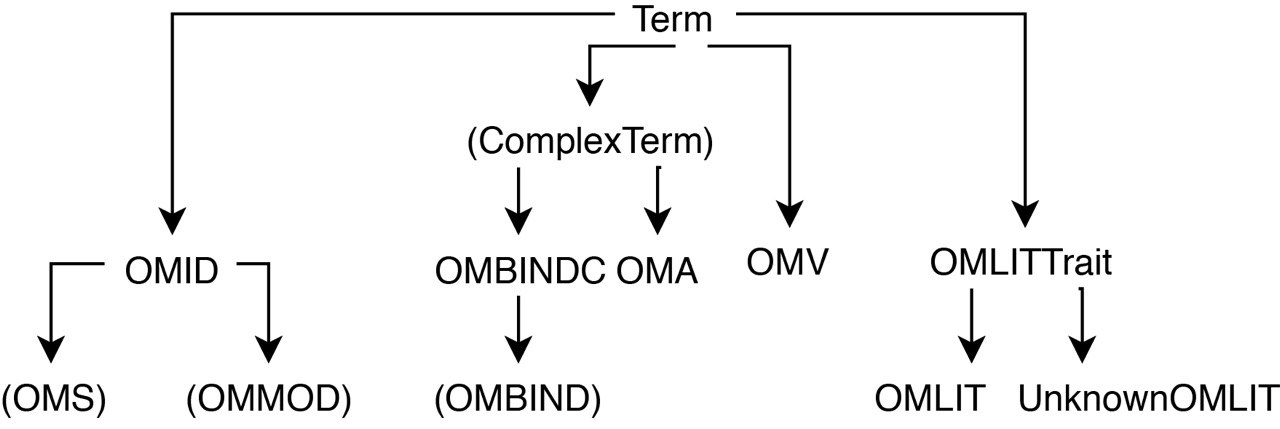MMT Objects

objects.Obj is the top level datastructure for all objects.
These are terms, variable declarations and contexts.
objects.Termhas the following important subclasses, all of which are scala case classes:OMID/OMS:OMIDis the case class for references to content symbols taking aContentPathas argument.OMSis a helper object (with convenience apply/unapply methods) for the case, where the path references a declaration, i.e. is aGlobalName.OMA:OMAs represent function applications. As such, theOMAcase class takes a function (Term) and the argument terms (List[Term]) as arguments.OMBINDC/OMBIND:OMBINDCis the case class for complex binding terms, again with a convenience objectOMBIND(for the case, where the scope of the binder is exactly one term). It wraps around the binder (Term), a context (Context, for the bound variables) and a body (Term; the scope of the binder) as arguments.-
OMV: AnOMVis a reference to a variable. The case class takes theLocalNameof the referenced variable (or astring) as argument.OMVs can be substituted by arbitrary terms in an object. Forv:OMV,t:Termands:Obj, the expressionv/tyields a Substitution ofvbyt, which can be applied toswith the expressions ^? (v/t). OMLITTrait: the trait being used by all literals. It has asynTypemethod that returns its syntactic type. There are two variants ofOMLIT, differing mostly in theirvaluemethod:- An
OMLIThas a known [RealizedType]TODO and itsvaluemethod returns the corresponding type of its semantic type (declared asAny). - An
UnkownOMLIT** has no (yet) known semantic type - the latter is usually inferred during type checking, so this usually only occurs between parsing and checking. Itsvaluemethod returns the unparsed string of the literal value.
- An
Many of the content objects have
toTermmethods, that return the appropriate terms to reference these on the object level - usually anOMID(in the case of constants or modules), in the case of variable declarations anOMV. Similarly, terms have atoMPathmethod, that returns a path to a module in the case, where the term is a reference to a module (or a declaration within one).The class
objects.Traversercan be used to perform operations recursively on a term. A good example implementation of a traverser isobjects.PushMorphs.objects.VarDecl: represents a variable declaration. The case class takes a name (LocalName) and optionally a type (Option[Term]), definition (Option[Term]) and notation (Option[TextNotation]) as arguments.objects.Context: represents a list of variable declarations. In fact, implicit conversion methods declared in the Context companion object allow for using any instance ofList[VarDecl]as aContextand the other way around.